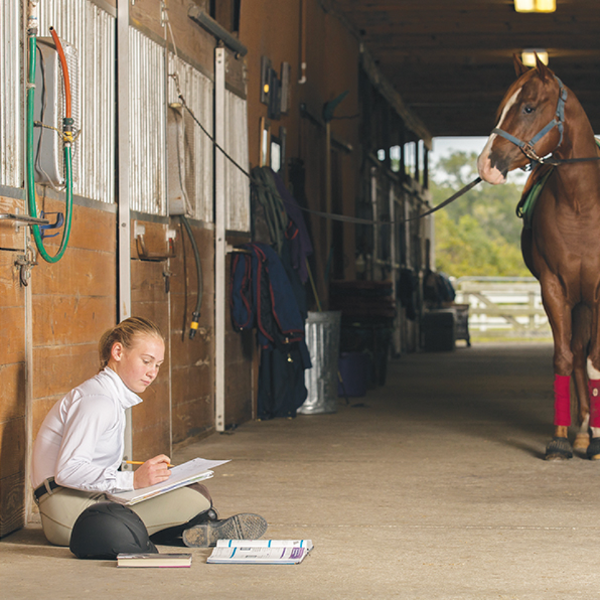We start learning when we’re born, and if we’re wise, we never stop. These are the words of wisdom once handed down from parent to child during a disagreement over the need to attend school. As we know, learning is a necessary part of life, and these principles can be applied to equestrian education as well.
No matter your discipline, riding is a sport you can participate in over the course of a lifetime. Of course, knowledge and skills must be gleaned and built upon throughout that lifetime, as progressing in horsemanship is a continuous learning process; however, there are groups and organizations with invaluable resources each step of the way to help grow and develop the equestrian’s knowledge base, riding ability, and skills.
4-H:
The National 4-H Council states, “4-H empowers young people with the skills to lead for a lifetime.” Although not solely focused on agriculture, opportunities to grow and learn in the equestrian field abound. For example, the local Woodstock Ghost Riders 4-H group learned the technique of horse judging and scoring over the last year and went on to compete (and place) in both the Regional and State Horse Judging Competitions.
According to Kyla Szemplinski, MS, of the UT-TSU Shelby County Extension Office: “4-H is one of the nation’s largest youth organizations that offers hands-on learning opportunities, developing life skills such as leadership, citizenship and responsibility through positive youth development approaches, and research-based educational programs that help youth become the best versions of themselves. Being a member of 4-H allows youth to meet industry professionals, work with adult mentors, discover their passions, and build their skill sets, all of which can help youth become positive influences in their communities and successful adult leaders.
4-H offers many educational benefits to youth. Agents work with youth in the field with
tangible educational materials that allow youth to experiment and discover something entirely
new they might not receive in lecture classes. Through 4-H, youth can participate in educational
contests where they can test their knowledge and skills against other youth regionally, statewide, and even nationally. These contests are designed to help youth improve their problem solving/critical thinking skills, communication, teamwork and decision making skills.
Besides contests, 4-H members also have opportunities to apply for and win scholarships only available to active members. To win these scholarships, youth have to demonstrate what they have learned and accomplished in 4-H with their projects, leadership and citizenship they have done within their county.”
Joining 4-H is easy, free, and open to all youths in grades 4-12. There is even a non-competitive group for those in kindergarten-3rd grade. Contact your county’s Extension office for more information.
Pony Club:
According to the United States Pony Clubs Inc. website, ponyclub.org, Pony Club is “an educational organization which builds the foundations of teamwork and sportsmanship through riding, mounted sports, and care of horse and ponies, while developing and enhancing leadership, confidence, responsibility, and a sense of community in its youth and adult members.” Started in 1954, its main goal is “to promote sportsmanship, stewardship, and leadership through horsemanship.”
Jocelyn Atkinson, District Commissioner of the West Tennessee Pony Club (WTPC), provides the following information: “Everyone is welcome to join WTPC! Kids ages 6 and up may join, and we have adult members as well. You can join as an unmounted member if you do not have a horse but still want to learn. Pony Club really helps kids to become independent and responsible for themselves and their horses. They learn excellent time management skills and present themselves well. They also gain a greater appreciation of how much work, time, and money goes into being successful with horses. ‘Hard work pays off’ is an invaluable lesson in life!
Pony Club kids grow up to be horse professionals or very knowledgeable amateurs with a comprehensive understanding of horse health and management. We have WTPC kids who are competing on top collegiate eventing teams, attending prestigious vet schools. and working as professional trainers. Pony Club gives them the foundational education and self-discipline to succeed in a variety of equine careers.
WTPC holds 2 meetings a month, one mounted and one unmounted. The mounted “meeting” is typically a riding lesson with a clinician or regional instructor focusing on one of the 3 disciplines of eventing: dressage, show jumping, or cross country. This month we have brought in Alex du Celiee-Muller from Little Rock for a dressage clinic; this summer we had Christian & Zoe Love, members of the US Mounted Games Association, come to us from Nashville to give a clinic on mounted games.
Our unmounted meetings focus on proper horsemanship (stable management and horse health). Here we bring in regional experts like vets & farriers to discuss common issues and best practices. At Pony Club you are tested on both your horse management knowledge and riding skills to become certified and move up the levels. We then send teams to compete regionally and nationally according to certification level. At these competitions, called rallies, members are scored on their horse & barn management as well as their riding. At competition, youth compete without the help of adults, which instills self-reliance, responsibility, discipline, and the ability to work together as a team. The US Pony Club publishes handbooks at each level, which we study for certifications and to compete as a team at Quiz Rally, which is like a knowledge bowl. Kids that participate in Pony Club become experts in proper horse management, safety, & equipment!”
Interscholastic Equestrian Association (IEA):
IEA was established in the spring of 2002 with just 200 participants; it now has over 14,500 members in 46 states across North America, according to the website, rideiea.org. IEA competition is offered across three disciplines: hunt seat, western, and dressage, and the wonderful part is, IEA riders do not need to own a horse or even tack to participate. In addition to the three disciplines of riding competition, IEA also offers an online Hippology Academy, Zone and National Scholarships, National Youth Board, and more.
With a goal of providing an affordable way for youth to participate in equestrian sport, IEA creates partnerships. Whether it’s a team consisting of horse and rider or friends at the barn, “an IEA rider has the opportunity to develop competitive riding skills, make lasting memories, and further his or her riding ability in college and beyond.”
“IEA’S mission is to promote lifelong involvement in equestrian athletics.” Good horsemanship and honorable participation are prioritized at every event and competition. Members are expected to “foster a spirit of belongingness, an atmosphere of community enjoyment, and a mutual respect for all participants.”
To learn more about this organization or get started on your IEA journey, go to www.rideiea.org.
Natural Horsemanship:
Natural horsemanship is less of an organization and more of a philosophy, incorporating the horse’s natural instincts and means of communication. Guided by natural horsemanship, an equestrian understands clear communication and positive reinforcement, such as applying and releasing pressure, are natural ways to train and create a partnership with the horse. Unlike traditional training methods that can incorporate fear, force, punishment, or dominance, natural horsemanship relies on a low-stress, patient approach which creates a true relationship between horse and human.
Anyone can learn these methods as a means to enhance his or her equine knowledge base. Natural horsemanship clinics are put on across the country to allow interested equestrians to witness this type of learning in person and gain both skills and confidence needed to incorporate natural horsemanship into their training. Natural horsemanship competitions are held as well, so trainers can showcase the bond they have created with their horse using these techniques.
To get involved, research a natural horsemanship trainer who appeals to you. Most of them offer memberships, videos, clinics, and more resources to help further your equestrian education and apply it to your horse.
Whether it’s 4-H, Pony Club, IEA, or Natural Horsemanship that appeals to you or your child, it is wise for equestrians of all ages to seek new ways to evolve in their learning and riding skills. Each of these programs provide the opportunities, knowledge, skills, and discipline needed to advance in riding, prepare for an equine career, or just prepare the equestrian for life in general.










